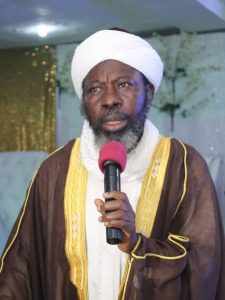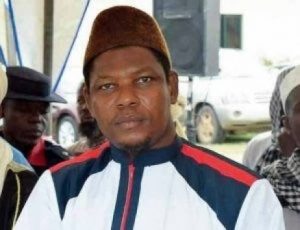Last Monday, the Presidency approved the partial reopening of worship centres two months after lockdown on religious gatherings over the Coronavirus pandemic. The Secretary to the Government of the Federation and Chairman of the Presidential Task Force (PTF) on COVID-19, Boss Mustapha, announced the lifting of the ban on religious gatherings at the briefing of the PTF in Abuja.
Mustapha however reeled out some protocols and guidelines to be followed by religious centers in the resumption, saying that they must be strictly adhered to and implemented to the letter. Muslim News earlier reported the guidelines.
Following the ease on the lockdown of religious centers, some stakeholders and leaders of leading faith-based organisations also shared their lockdown experiences, especially as they relate to religious activities and devotions, explaining the various steps taking by their organisations in attending to the Coronavirus situation.
NASFAT
The Chief Missioner of Nasrul-l-Fatih Society Worldwide, Imam Maruf Abdulazeez Onike told The Guardian that the organisation acted proactively to limit the community transmission of Coronavirus amongst its members by voluntarily shutting all its mosques and worship places even before the directive from the government.
He said: “NASFAT has since moved its flagship programme (asalatu on Sunday) to a virtual mode, same as its Friday service, and has also introduced other online programmes leveraging technology to reach a wider audience. Of recent, NASFAT developed a set of guidelines for the operations of our worship places and offices once government lifts the lockdown.

“While we appreciate the brotherhood, congregational benefits, emotional support and social-economic gains that worshipping together would generate, the safety of our people is paramount and cannot be traded for anything. Moreover, when the government has not told us that the curve is flattened yet.” He added that the group misses the physical connection, handshaking and seeing the expressions on the faces of members but still connect and interface with members regularly through various online activities.
“NASFAT is conscious of the fact that worshippers come to places of worship for salvation and not for destruction or calamity, hence the extra measures being taken to protect them by God’s permission. I pray Almighty Allah removes the pandemic soonest from the surface of the earth. Aameen.”
Onike said what should be uppermost in the mind of Muslim leaders on the issue of re-opening of places of worship “Is the main objective of the Shari’ah nay Islam, which are promotion and enhancement of benefit and removal of harms.”
Mufti, CIO
On his part, the Grand Mufti, Conference of Islamic Organisation (CIO), Sheikh Dhikrullahi Shaafi, said he missed many spiritual activities, which he rendered to the public before the lockdown. He, however, said the period afforded him the opportunity for closer interaction with his family.
“As a Muslim cleric, I missed my Friday Khutbah, that is, sermon. However, I lead members of my family in all the daily prayers including Friday prayers.
“I also missed my series of public lectures, counseling and teaching of Islamic jurisprudence face to face. Despite all odds, we must thank Allah for the gift of life and good health.”

He urged Muslim faithful not to see the action of the government as impunity but as a commitment to the wellness of the citizens.He noted that Islam gives priority to life and welfare. “We should all be patient and respect scientific facts. I also believe that mosques and churches are shut based on pieces of advice given by medical experts. In recent times, the rate of infection has remained very high. I am optimistic the mosques and other places of worship would be opened after all the necessary measures and guidelines are finalised and approved,” he added.
UNILAG Imam
Chief Imam, University of Lagos (UNILAG) Muslim Community (UMC), Dr. Ismail Musa, said the COVID-19 pandemic affected different areas and jurisdictions in unequal ways, noting that it undermined the several social and spiritual values of worship. He, however, noted that the basic objective of the Shari’ah is to preserve life, stressing that no effort should be spared to guarantee that.
“The mosque itself as a rallying point for effective management of Islamic activities has been unable to play its roles. People rush physically to the mosque to enrich their knowledge about God and how to relate with Him and His creatures. The vital educational programme has been seriously truncated. I miss the sermons and its impact, the pre and post-sermon activities. Allah speaks to us through the sermons. We are not used to the electronic mode of sermon delivery. Many potential beneficiaries are denied the opportunity of accessing digital sermons,” Musa said.
He added: “We have sensitised Muslims on the need to take advantage of the lockdown to deepen their relationship with God. For instance, individual night vigil prayer called tahajjud is much more spiritually rewarding than when performed in congregation. Through regular and special admonitions people are accessing crucial information about God. We have been utilising the opportunities offered by digital communication. The internet and phones have particularly been helpful in many respects. It has brought out the immense resources Allah has domiciled in mankind. We thank Him for them.”
TMC Amir
For the Amir, The Muslim Congress (TMC), Dr. Lukman AbdurRaheem, the group has missed many programmes.
“We resorted to virtual options to keep our members and well wishers engaged. Some of the physical programmes that we missed include weekly lectures in over 300 mosques across the Southwest in including Abuja and Niger; monthly Adhkar prayer sessions; monthly public lectures across the functional states where TMC operates and spiritual counseling for Muslims”.
He said COVID-19 has taught Muslims and leaders of Islamic organisations that there are always alternatives in life.
“We should avoid insisting on our comfort zone. Every member has been taught and educated to take up the role of Imams in their respective houses. This has increased affinity, bonding and oversight over the spiritual and material wellness of the family members,” he added.
Muslim Volunteer Group
To the Imam and General Coordinator of Muslim Volunteer Groups to Lagos State Correctional Centres, Alhaji Muhammad Miftahu Alade, the ban on religious gatherings affected the spiritual uplifting of Muslim and Christian inmates in Nigeria Correctional Centres (Prisons). He stated that Muslim and Christian clerics could not gain access to the inmates not to talk of teaching them the rudimentary aspects of their religion.
“The social distancing imposed by the government greatly affected the inmates. When the chaplains could not gain access to the inmates, the inmates will misbehave; they will not be able to attend to their daily communion with God; they will be left without guidance and in effect, it will have negative effects on the custodian officers. The crime, which the government is trying to contain may escalate and lead to unsuitable circumstances.”

He urged the federal and state governments to allow religious activities in the Correctional Centres.
“There should be guidelines which the Imams, the Pastors and other stakeholders should abide by if they are to visit the inmates. Protective kits should be provided, social distance should be maintained, large gathering should be limited, and the government should assist us by ensuring that relief materials, which were donated by religious and philanthropic groups get to the inmates,” he said.
MSSN Lagos
Leader of the Muslim Student’s Society of Nigeria (MSSN), Lagos State Area Unit, Dr. Saheed Ashafa, said the lockdown experience has been unprecedented.
“It has overbearing effects on the activities of the organisation. All our regular programmes were suspended while special programmes of high spiritual magnitude were cancelled. For instance, our weekly Usrah is the spiritual gathering that nurtures our souls as students and shapes our well-being for all-round development. But we had to suspend all these. The suspension may have negative consequences on new members who are just coming up spiritually,” he noted.
He added that the group’s annual programmes like Lagos Qur’an Competition and Iftar 5000 were cancelled outright. “This is highly devastating when properly evaluated. These are programmes that bring large gathering of not less than 3000- 5000 members together. They are gatherings of high spiritual impact, which involve coming together to pray and fraternise,” he said.
Ashafa noted that the organisation has been impacting the lives of its members through online programmes.

“Our weekly Usrah still holds via Facebook and Zoom platforms. We organise daily academic coaching for secondary school students. We are organising capacity building training for students of higher institutions through these virtual platforms with seasoned experts and professionals as resource persons. But the truth is that these platforms are not yet as effective as the usual physical meetings. There are challenges hindering optimal performance,” he said.
Nigerian Navy Imam
The Civilian Imam of Nigeria Navy Secondary School, Ojo, Mr. Tiamiyu Adebayo said the lockdown deprived him of the opportunity to discharge congregational duties.
“The situation has affected the school’s religious activities. For instance, the weekly Jum’ah service whereby we pick a topic bordering on religion as well as humanity in general is banned. Secondly, the 9th month of hijrah calendar called Ramadan, during which we used to have programmes such as Ramadan Tafsiir, Iftaar- breaking of fast together, feeding the students and other rewarding programmes, just came and went like that because of COVID-19.”
Adebayo regretted that he missed all the rewards attached to congregational prayers during the period.
“I missed the rewards of congregational prayers which Prophet Muhammad (S.A.W) said attracts 27 rewards per a congregational prayer,” he said.
Safaudeen-in-Islam Worldwide
Also speaking, the Founder of Safaudeen-in-Islam Worldwide, Prof. Sabitu Olagoke, said the present situation has altered and disrupted the structural design of Islamic worship styles. Olagoke said: “It has disrupted Jum’ah services and asalatu. It has made adherents to become lazy. The motivation is no longer there.”
Source: The Guardian



